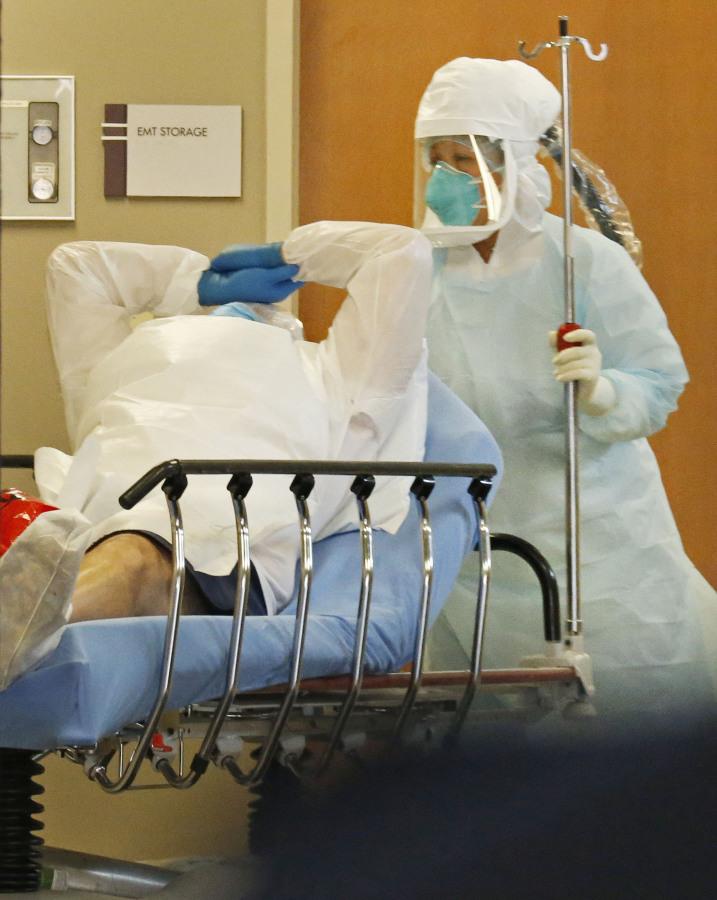Ebola Panic
Incurable virus sweeps West Africa and enters the United States
(Louis DeLuca/Dallas Morning News/MCT - used with permission.)
A patient transported from Frisco, Texas, with concerns of possible exposure to Ebola, arrives at Texas Health Presbyterian Hospital in Dallas on Wednesday, Oct. 8, 2014. (Louis DeLuca/Dallas Morning News/MCT)
An outbreak of the incurable viral disease Ebola discovered in the West African nation of Guinea (where there has never been a recorded instance of Ebola before), has since become the deadliest outbreak of the disease since its discovery in 1976. According to the latest World Health Organization (WHO) report more than 3,000 people in the West African countries of Guinea, Liberia, Sierra Leone, and Nigeria have died from the disease with another 6,500 infected.
Ebola, first discovered in what is now the Democratic Republic of the Congo, is a viral disease that can be transferred from animals like fruit bats, a West African delicacy, to humans through direct contact. Between people, according to the BBC, it is spread through “direct contact with blood, bodily fluids or organs, or indirectly through contact with contaminated environments.” However, people can remain infectious after recovery for weeks due to the viruses still remaining in their bodily fluids.
Symptoms begin after an incubation period lasting 2 to 21 one days. According to the WHO, initial symptoms of Ebola include fever, muscle pain, sore throat, headache, and fatigue. Later symptoms include diarrhea, rash, vomiting, impaired liver and kidneys, and, potentially, internal and external bleeding.
Certain religious and, in particular, burial practices native to the region can potentially spread the virus. According to the BBC, in Liberia and Sierra Leone burial preparations often involve a lot of physical contact with the body, putting those involved at great risk if the person died of Ebola.
Health workers are especially at risk. In September, WHO reported that 211 workers have died since the outbreak with another 375 were infected. This includes the handful of Americans who were infected and transported to the U.S. for treatment. In addition to the dangers surrounding those treating Ebola victims, the BBC also reports that the countries where the virus is most prevalent are also suffering from “a severe shortage of hospital beds,” putting even more pressure on the weak health care systems of those countries.
WHO declared this most recent Ebola outbreak an “international public health emergency.”
— Ian MacLeod
According to the BBC, WHO declared this most recent Ebola outbreak an “international public health emergency.” BBC also reports that President Obama “called for more urgent action in the response to the outbreak” during the United Nations General Assembly on September 25, and has also said that Ebola is a “threat to global security.” According to USA TODAY, 3,000 U.S. Troops are heading to West Africa to help build health care facilities. Sierra Leone, one of the worst infected countries, has also instituted curfews to help stem the rate of infection and has placed an area containing more than a third of the country’s population under quarantine.
As of September 25, the present outbreak’s mortality rates are around 70%, but past instances of Ebola have reached a 90% fatality rate. Though the BBC reports that the outbreaks in Senegal, Nigeria, and Guinea are being contained or are stabilizing, the WHO estimates that there “could be as many as 20,000 cases (of Ebola) by November if efforts to tackle the outbreak are not stepped up.” On September 30 Thomas Eric Duncan, was hospitalized in Dallas. He had travelled from Liberia (the worst infected country), and became the first person diagnosed with the disease in the U.S. He later died, and two of the Dallas nurses that treated him have since been diagnosed increasing worries about the spread of this deadly disease.

Ian MacLeod is a member of the class of 2016. He joined the Green Wave Gazette his freshman year and became the Associate Editor as a sophomore and Editor-in-Chief...






